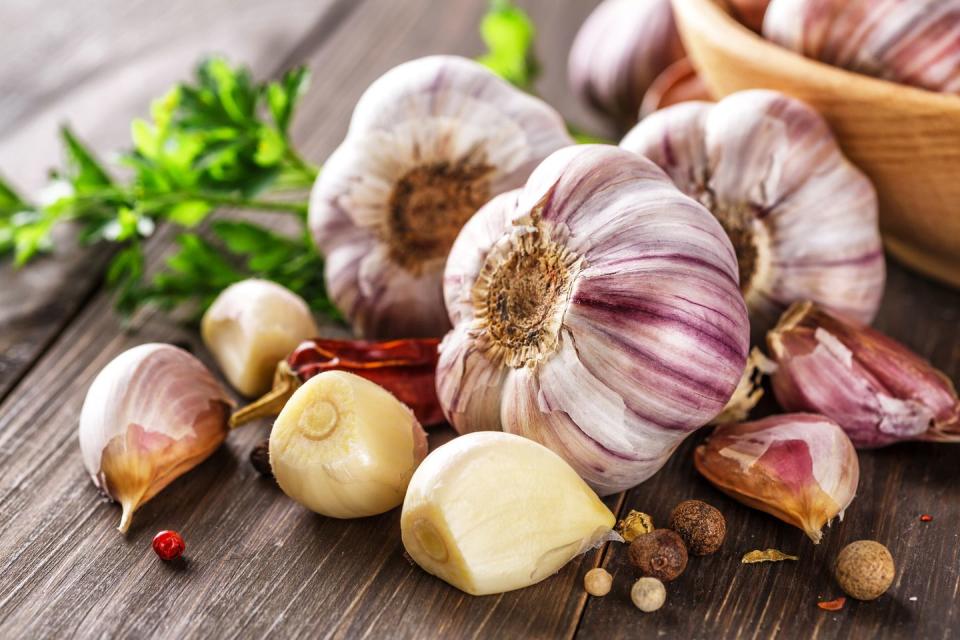8 Proven Ways Garlic Can Benefit Your Health

Garlic is one of the oldest known crops in the world, and in addition to folklore tales of keeping vampires away, it has proven to have some serious health benefits. According to the Journal of Nutrition, Olympic athletes in ancient Greece used garlic as one of the earliest performance-enhancing agents. There is also evidence that garlic was used as a remedy throughout history to treat a variety of ailments, which is why it has been given many nicknames ranging from "Russian penicillin" to “natural antibiotic” to “vegetable Viagra,” among others. Today, garlic is available everywhere, and the studies on its health benefits are endless.
Is garlic good for you?
Yes! While many studies have demonstrated the anti-inflammatory and anti-microbial benefits of garlic, there is also promising research that garlic could help in the prevention and management of certain types of cancer. Additionally, garlic's health benefits may reach even further to promote better gut health, help you to live longer, resist osteoporosis, and improve cardiovascular health. Below are eight science-backed ways garlic may benefit your health.
Health benefits of garlic

1. Garlic may have anti-viral effects
Garlic has long been associated with immune-boosting and anti-microbial benefits. Most of the health benefits found in garlic come from the sulfur compound allicin which is released when garlic is cut, crushed or chewed. A recent study suggests that garlic may boost the body's immune system to better deal with viral infections.
2. Garlic may reduce blood pressure and cholesterol
A recent review of studies found that garlic was shown to reduce blood pressure and cholesterol in patients with and without hypertension. Another study showed that garlic could lower unhealthy (LDL) cholesterol and triglycerides, and yet more research shows that aged garlic extract could reduce blood pressure in patients with uncontrolled hypertension. Plus, it may be effective in improving arterial stiffness and inflammation.
3. Garlic may boost gut health
Garlic contains the fiber inulin, a prebiotic, which is known to boost good gut bacteria. A recent study in mice showed that when they were given an oral supplement made from dried whole garlic, it reduced the negative effect a high-fat diet can have on cholesterol levels and on the microorganisms living in the intestinal system (a.k.a. gut microbiome).
4. Garlic may have anti-cancer properties
According to the American Cancer Society, colorectal cancer is the third most common cancer in both men and women. A recent study involving 833 people in China found that consumption of vegetables containing allium (like garlic, leeks and onions) was associated with a lowered risk of colorectal cancer.
“Reports from the American Institute for Cancer Research show that eating garlic frequently may lower the risk of certain cancers such as colorectal cancer by helping with DNA repair, slowing the growth of cancer cells and decreasing inflammation," says Stefani Sassos, MS, RDN, CSO, CDN, Deputy Director of the Good Housekeeping Institute Nutrition Lab.
5. Garlic may contribute to longevity
One recent study that looked at more than 27,000 individuals in China, found that regular consumption of garlic was associated with lowered all-cause death risk. The study produced statistically significant findings that showed eating garlic could extend life by half a year.
6. Garlic may have anti-inflammatory benefits
One study that looked at women with rheumatoid arthritis found pain intensity, tender joints and fatigue were significantly decreased, compared to the control group, when they took a supplement containing 1000 mg of garlic. Additionally, the Arthritis Foundation recommends consuming garlic due to its antioxidant and anti-inflammatory compounds.
7. Garlic may help to improve bone health
A study in Iran involving garlic extract looked at post-menopausal women with osteoporosis. The study findings indicated that orally administered garlic supplements could facilitate calcium absorption which can lead to stronger bones.
8. Garlic may improve cognitive function
While studies in humans are limited, animal studies have recently shown that consuming aged garlic extract could play a positive role in preventing the decline of learning and cognitive memory functions that are associated with Alzheimer’s disease.

How to include more garlic in your diet
Allicin, the active molecule in garlic, contains many possible health benefits and antibacterial properties and is released by chopping or crushing garlic. Studies have shown that this active compound can be destroyed by heat, so consuming raw garlic is the best way to get all the benefits.
"After chopping or crushing garlic, allow it to sit for approximately 10 minutes before adding to food or cooking. The reason lies in giving the enzyme alliinase time to fully develop and produce the active compound allicin," says Sassos.
For best storage tips, store whole garlic at room temperature and place peeled garlic in the fridge. If you have a lot of garlic on hand, it can be stored in the freezer.

Side effects of garlic
In addition to causing bad breath, garlic may contribute to gas and bloating in some people, especially those who have IBS. Garlic is considered a high FODMAP food, so if you have IBS or are following a low FODMAP diet, you may want to proceed with caution or avoid it altogether.
If you are currently taking blood thinners, such as warfarin (Coumadin), you should consult with your physician before you increase your garlic intake, as garlic can interfere with certain blood thinning medications.
If you find that you are sensitive to garlic, there are other potential ways you can include it in your diet. Try cooking with a whole garlic clove and removing it before eating your dish or using garlic-infused oil.
The bottom line
Garlic not only adds flavor to your meals, but the evidence shows that it has promising anti-viral powers and it can be used as an anti-inflammatory that is easily accessible with few, if any, side effects. There are also suggestions that it works to decrease the risk of certain cancers, as well as promising evidence that it may be useful in the fight against cognitive decline, among other benefits.
While there is no recommended daily limit on how much to eat, it is "generally recognized as safe" (GRAS) by the U.S. Food and Drug Administration. A good rule of thumb is to consume in moderation. If you are considering consuming garlic as an oral supplement, we recommend consulting with your healthcare provider first.
You Might Also Like

